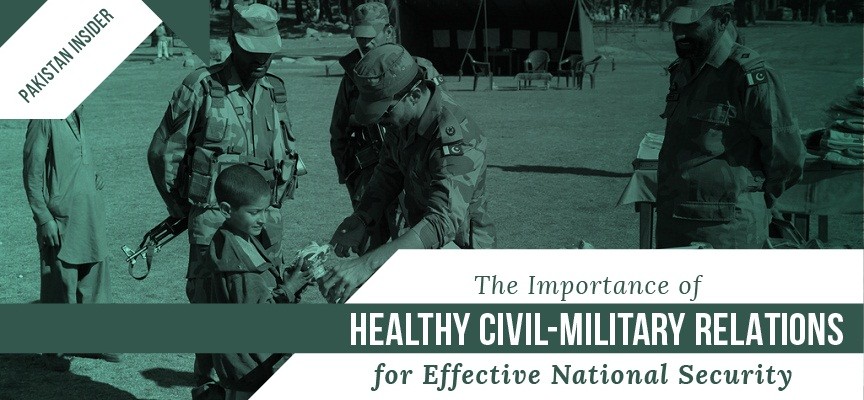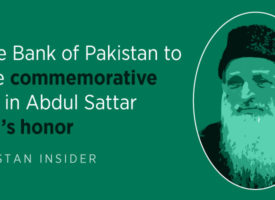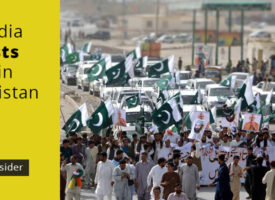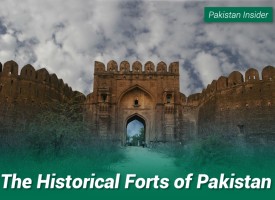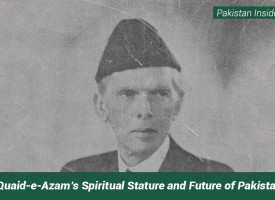Civil-Military Relations or CMR is defined as the relationship between the civilian authority and military organizations. They are a set of cohesive measures designed to ensure that a stable equilibrium exists for the smooth running of a country. In Pakistan, for instance, the civil authority refers to the political and administrative setup (Prime Minister’s Cabinet, the President, various civil agencies and heads of ministries such as the Ministry of Interior and Ministry of Health); whereas military organizations are principally the armed forces (army, navy and airforce).
Healthy CMR is considered as the backbone of a stable and developing country; a state where civil authorities work individually or jointly with their military counterparts to ensure that the well-being of the populace is not disturbed by undesirable incidents or occurrences. The military component is like the Yang to the civil component’s Yin, and vice versa. Besides complementing each other, these distinct components of law and order are stand-alone stabilizers in their individual selves, designed to act within their prescribed constitutional limits.
We do not need to repeat volumes of history to mention how Pakistan has tremendously suffered because of unstable CMR. From the first ever martial law to the oft-visible friction between the army and political leadership on issues of national importance, the lack of understanding and willingness to sort out mutual differences is disturbing, to the least. The national security apparatus stands upon two pillars, the civil and military. If either one develops fissures in its structure, having the other pillar in perfect condition will not matter. With due course of time, that pillar too will be crushed under the heavy burden of responsibilities towards the citizens.
In any developed country, the police is responsible for protecting the lives of its citizens. The military, however, is given the responsibility to protect the state’s very existence i.e. territorial integrity, national sovereignty, etc. It is a great dilemma in Pakistan that the military has been given the additional burden of performing police duties win a state of war. This worrying predicament is nothing but a slow cooking recipe for disaster.
Allow me to explain through a few examples:
1. The army is already overstretched in a nationwide counter-terrorism operation; from the tribal areas of badlands in the north to a rising insurgency in Balochistan to the west, from targeted operations against sectarian hotbeds in southern Punjab in the east to the violence-infested metropolis of Karachi in the south. Never before has the army been so engaged in such efforts of a massive cleanup. Not a single battalion of the army, let alone a brigade, is in passive mode. They are working round the clock in keeping tabs on miscreant elements in cities and villages. Primarily, this is what the police is supposed to do.
2. Parallel to anti-terrorist operations, the army is simultaneously engaged in development work in war-torn areas such as Waziristan and Balochistan. What has development and rehabilitation got to do with the military? Most importantly, why should the army, in Pakistan’s instance, use funds from its own insufficient defence budget to invest in its affected citizens? These are, of course, gestures of affection and care to support the people who stand behind this very army as guardians of the homeland. The question here is, why does the civilian setup not take its officers to task, the bureaucrats and politicians who suck billions out of the national exchequer every month to satiate their limitless desires?
3. The army of any country deals with terrorism, not crime. It is the police which should tackle criminal elements and ensure peace in alleys and neighborhoods. As many have witnessed in the special case of Karachi, crime and terrorism have intertwined so closely together these past years that it has become impossible to separate each from the other. Criminal gangs engage in terrorism for large gains whereas terrorist groups engage in crime for financial support. It is shameful in itself for the situation to have worsened to such an extent. Were the Law Enforcement Agencies (LEAs) sleeping? Or were they knowingly part of the problem and not the solution? In recent high-level meetings in Karachi, notably the Apex Committee huddles at Governor House and then HQ V Corps, repeated emphasis has been laid by the concerned military authorities on the need for political ownership of their national security initiatives in the province (Sindh). The current regime in Sindh is unwilling to cooperate and so far has been proving itself a thorn in the eye for those who actually care for the country’s wellbeing. KPK is infested with a horde of illegal Afghan refugees who found new markets for illegal narcotics and also to spread terrorism on behalf of the Afghan intelligence agency NDS. Since the Zia era, the northern areas of Pakistan have become the image of lawlessness, crime, drugs, weaponry and radicalization because of the Afghan menace which cunningly penetrated into the social fabric of otherwise well-educated Pathans in the province. In Balochistan, India and the Gulf states have sponsored a range of sub-nationalist and sectarian jihadist groups respectively, to secure their strategic interests in the mineral-rich province. Punjab, mostly excluded from such “limelight”, is the actual hotbed of extremism where terrorist sectarian organizations in Southern Punjab issue speeches, statements and publications which promote virulent thought; a set of ingredients which are injected into would-be militants and suicide bombers to carry out attacks against humanity. Where is the National Counter Terrorism Authority (NACTA) and its much famed National International Security Policy (NISP) which was supposed to keep a check on terrorist ideologies, financing and operational preparations?
Needless to say, the onus of these reckless behaviors and shortcomings cannot be solely put on the civil component. The military component, to some extent, is equally to blame. Were it not for the ambitions of a few power-hungry generals to impose dictatorships, the government infrastructure in Pakistan would not have been in the miserable condition which it is today. In the past, there have also been certain senior military officials who prioritized attainment of lands and plots over defence of the country (sadly, even during times of war).
This is precisely why the civilian and military setup should sit together, evaluate past mistakes and devise a robust collaborative framework for the immediate and long-term future. These operational and strategic plans of action require all-inclusive stakeholder input from political parties, the bureaucracy and military personnel. Unless determined efforts are put in place to foster healthy CMR, the present imbalance will ultimately cause one end (civilian component) to collapse. Anarchy, massive disorder and urban terrorism are some of the major outcomes of such a dangerous mismanagement.
The constitutional loyalty of the present military leadership, under the able command of General Raheel Sharif, is being put to test. Many people have been raising slogans, as in the past during such crises, for the army to overthrow the regime and take charge of the country. This is a fantastic proposition on the outset but will prove damaging in the long run. Troops are meant to fight wars and protect the homeland from incoming dangers. At present, our army is already engaged in sub-conventional operations against internal threats, will it later have to confront the civilian setup as a national security threat too?
The odds, however absurd they seem, cannot be ruled out. Pakistan has the unique distinction of the being, perhaps, the most unexpected country in the world. Just about anything, whether good or bad, which is unexpected, can emerge from its soil. The people are committed to uprooting terrorism and not just crushing it temporarily. The ordinary civilian populace has extended complete support to Operation Zarb-e-Azb. In this civilian component, what role will the civilian government play? Will institutional dormancy and zero political willpower cause the prevailing imbalance of CMR to tip over once and for all?
Sense and seriousness are the most urgent need of the hour. The civilian government and military forces have equally important and focused roles to play. If Pakistanis want peace to be restored in their country, especially through the ongoing military operations, they must press all concerned stakeholders to come on the table and develop healthy CMR.
Featured image credit: usarak/flickr

